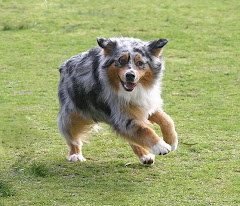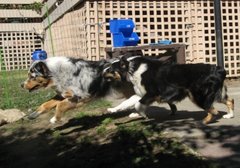Sooo some photos from the night!
 A nice snap of mum...
A nice snap of mum... Su Jen belting out the tunes
Su Jen belting out the tunes Ahhh a nice duet between mum and dad - yup that's right, block your ears... dad had a tune or two!!
Ahhh a nice duet between mum and dad - yup that's right, block your ears... dad had a tune or two!! and of course thoroughly enjoyed himself too!
and of course thoroughly enjoyed himself too! Even Ah Yee had a song or two to sing!
Even Ah Yee had a song or two to sing!

Well I went to a very enjoyable seminar today entitled “Behaviour at Breakfast – Dispelling the “dominance” myth and achieving control of dog behaviour.”
Naturally I was dragged kicking and screaming along to the seminar and only went for the promise of food *vbg*.
We had 4 guest speakers:
Dr Pauleen Bennett – touching on the human perception of dominance and it’s way of how we interact with the natural world.
Dr Robert Holmes – on using an anxiety or frustration based model as opposed to dominance on modifying dog behaviour
Dr Debbie Calnon – on reconstructing our relationship with dogs with behavioural disorders without ‘dominance’
And finally
Dr Gaille Perry – on controlling puppy classes, teaching control of puppies and learning self control by pups.
The seminar was great – while it covered a lot of what I’ve been discussing and researching in the past 12mths, it also cleared up a lot of grey areas I was unsure about and provide further insight. This is going to be a long post whilst I go through what each person covered, so sit down, grab a cuppa and enjoy ;). For those NOT interested – keep scrolling as I have more stuff, and make sure you check out the piccies of Kinta in my previous post!!
Pauleen is an excellent speaker and really engages with her audience. I love listening to her! Pauleen initially touched on how humans evolved and how most of our communication and ‘descriptions’ of things, emotions and even the way we teach young children is built around animals as that is something that is universal to all of us and we can connect with. Through evolution, human has developed a frontal lobe which is much more developed (we think!) than any other species. This gives us firm grounding for thought, imagination, thinking of the future and so forth.
Pauleen also touched on how our perceptions of one individual (the wolf as an example) has changed throughout the centuries. Initially they were evil, then vermin, then endangered species that need aid, to pets and perhaps even hero’s.. If our perception of one species can change so rapidly in a few short years, then can this also be true for the way that we perceive the way we interact with them?
The theory of ‘dominance’ is often reinforced with us through documentaries such as those offered through National Geographic and such. This is because much of the show focuses on active displays of dominance between other animals in the ‘pack’ or social structure. Often, this is the case that while it only takes up a *tiny* amount of their actual life, it’s portrayed a lot on discovery channels because really, who wants to watch an animal sleep ;-). Often, we see the dominant animals as being those that have first access to food, a greater number of reproductive success and rule over the weaker ‘herbivores’… however, could this perhaps be a little misleading…. When you look in proportion to how many insects there are to herbivores, to carnivores… to actual dominant individuals….. food for thought… similarly, if dominance is always so effective, why isn’t their more of it? Shouldn’t more animals employ this in order to have access to the best resources? Think also of the two ‘dominant’ males fighting over a female for reproduction success…. What’s to say that in the middle of the fight, mr subordinate has not come in and mated with her in the meantime?!?!
Think again to our world “leaders” – is it those that power us with fear and ‘world domination’ or is it those similar to Ghandi and Mother Tereasa who leave a more lasting impact. Sure, we can dominate creatures – we can dominate our children and our wives, show them who is boss through violence – but is that really how we would like to be? Or would we rather live through calm, steady leadership. Think to your favourite teacher – was it one who dominated you and belittled you, or one that was understanding, compassionate and appreciative of you? Should we not offer the same leadership and understanding to our animals?
Robert was also a very engaging speaker. I’ve heard him speak before, but I enjoyed this one a lot more – he seemed more… ‘relaxed’ I guess….
He touched on the fact that many of our ‘dominance’ related behaviours tend to be misinterpreted and thus treated incorrectly, perhaps making matters worse. Therefore, it is better for us to treat the anxiety or frustration behaviours first as this has been more successful and humane towards the animal. It has been drilled into us from as young as we can remember that we need to ‘dominate’ our dogs in order to be good owners – we need to ‘show them who’s boss’ or they won’t ‘respect’ us. I am sure you have heard it all before! However as many of us have discussed, dominance simply means a priority to an access…. But the VALUE of that resource will of course chance dependant on how the individual is feeling at that particular moment….. will the bone in the yard be of the same value to a dog who has just eaten, to one that has not eaten for a week? How can a truly *dominant* dog ‘lose out’ over the bed, toy, or access to the human on any given day?! We quickly find that dominance itself is not a linear graph and perhaps not as set in concrete as we would like to think. After all – we must remember that “dogs work for what works” as well as for what they want right?!?! How can a dog, who’s behaviour is described as ‘dominant’ then be a real ‘wuss’ in the same breath?
Robert then went on to explain the four emotional states:
*Should the event be both controllable and predictable, the animal is optimistic that it is in ‘control’ of the situation.
*Should the event be unpredictable, yet controllable, the animal will feel some level of anxiety.
*Should the event be both uncontrollable and predictable – this will lead to frustration.. (think correction in relation to a fearful stimuli)
*Should the event be both unpredictable and uncontrollable – this will lead to a depression of behaviour (shut down or learned helplessness).
Is dominance therefore – merely an attempt for the animal to control the situation? Usually these animals have poor control over themselves and their emotional state also.
Robert further went on to discuss anxiety and frustration itself and what this entails for the dogs (with the aid of some video’s also). If we can understand this, we can then apply a variety of models in order to help the animal work through / with the situation. He went through a systematic approach to anxiety type behaviours:
• Clinical exam
• Avoid the stressful circumstance (well…. Duh!)
• Calming management – distract, massage, variety of tools to help calm the dog
• Increased assertiveness (don’t like this word, so shall we say control or just teaching a dog to offer an alternative behaviour)
• Medication – reduce anxiety or reactivity in order to aid the training and management of behaviour
• Desensitisation
• Enrichment
• Muzzle if necessary
He also mentioned a ‘six pack’ system which is as follows:
• Avoid
• Distract/ calm (prevent emotional state from occurring)
• Assert (general leadership – let dog know we’ll ‘deal’ with the situation)
• Medicate
• Desensitise
• Enrichment
In conclusion – Robert was trying to highlight the fact that we should rather than always focus on ‘dominance’ look at these type models instead in order to work with the situation.
Debbie touched more on dealing with the clients I guess. (Gee – this is taking a while – I hope people read this, so you better comment!!!! ROFL!). People have certain perceptions and expectations when they purchase a pet – whatever that may be. Usually, dealing with a behavioural issue is not included in those expectations!!! Often these behavioural issues will affect or permanently change the relationship between owner and pet. This is particularly true if the said owner has been told it’s *their* fault because they weren’t ‘dominating’ or ‘controlling’ enough over the dog. Because of this change in the relationship, many owners do feel a sense of loss about that relationship they once dreamed of with their dog. This therefore means that a grief and loss framework may be important when dealing with such clients.
Naturally the ‘dominance’ theory has descended from the ‘fact’ that dogs have descended from wolves…. But now what we realise are that these ‘dominant’ wolf packs are merely family groups, and wolves are no more dominant over their pack than your mum or dad is dominant over you. Do you see your parents as a good leader, or as a dominatrix? Think again to the fact that dogs may infact have evolved as scavengers rather than hunters and therefore don’t tend to form as strong pack relationships. How can we win a ‘dominance battle’ with our dogs regardless?! They are designed to ‘win’ a fight, we are not. Therefore, should we not use our head in order to ‘control’ and communicate with our dogs as opposed to our anger, emotions and physical attributes? Particularly when the serious behavioural issues are often involved with aggressive responses, through which a ‘dominance display’ by yourself could infact (or is that most likely) make the behaviour worse….
While we are ‘dispelling’ the dominance theory, it is important that we do not become ‘permissive’ to our dogs – the rules still apply and dogs still require guidelines. However, rather than being forceful about getting a dog to toe the line… it’s more about co-operation and getting the dog to *want* to do it because they know what is in it for them if they comply. Unfortunately however, dominance is often a self- fulfilling prophecy.
We should spend our time helping clients understand the basis of learning theory and how to bring about a positive change in the dog as opposed to focusing on the ‘dominating’ behaviour of the dogs.
Gaille spoke about puppy classes and how they have changed over the years. Previously the main focus was on ‘socialisation’ and puppy play. Now we are seeing the PPS classes as being an area ideal for owner education on the correct way to interact with their puppies, as well as focussing on socialising, but letting them do the majority of that in their own time in less stressful environments. There wasn’t a lot covered here which hasn’t really been touched on previously or what was ground breaking. It was more about the way that we run the classes and giving the dog something desirable to do, rewarding the behaviours we WANT (rather than ignoring them!) rather than constantly punishing or dominating the dogs. I guess it once again comes down to how many things can dogs do wrong, in order to find out what they can do right?! I liked her way of explaining ‘time out’ as being not a punishment but a management exercise to help the dogs calm down and prevent the behaviour from getting worse. This will certainly make it much easier for me to explain the circumstance to our own clients.
Puppy play is now considered ‘not the norm’ which is fine – although I *did* like how she mentioned controlled puppy play with 2 pups and regular call backs as a good thing to do if the dogs’ temperaments are compatible. This I agree with because what better place than PPS to teach the *owners* how to read their dogs body language and make them more aware of the subtle signs of what the dogs are saying. JMO. Some things I questioned as I felt that we were ‘hindering’ the dogs in some way – I am still a believer of the fact that you can’t, much as you try control EVERYTHING in your dog’s environment. While they *should* know better, you can’t stop a moron, plonking your dog on the head, kids running up to a dog or jumping up and down in front of them, or bringing their half crazed dog up to say ‘hi’ while yours is tied up. Therefore, I *still* believe that we should utilise these situations as a ‘training exercise’ to show the dog how to behave appropriately and be rewarded for doing so.
Ok – so an insanely long post and a bit of a cover from what we discussed today. Like I said – nothing groundbreaking, but very interesting all the same!!!











2 comments:
Sounds like it was an interesting seminar.
It's funny i was looking at my old animal behaviour textbook just the other day and thinking how i should have a read through it (seen though i never used it once during uni lol) and now you have totally inspired me to do so. I knew there was a reason i kept it ;)I always enjoyed the animal behaviour subjects the best.
hahaha - enjoy the read - I never did read that one much ;)
Post a Comment